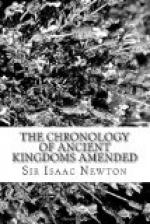That the Israelites used the Luni-solar year is beyond question. Their months began with their new Moons. Their first month was called Abib, from the earing of Corn in that month. Their Passover was kept upon the fourteenth day of the first month, the Moon being then in the full: and if the Corn was not then ripe enough for offering the first Fruits, the Festival was put off, by adding an intercalary month to the end of the year; and the harvest was got in before the Pentecost, and the other Fruits gathered before the Feast of the seventh month.
Simplicius in his commentary [60] on the first of Aristotle’s Physical Acroasis, tells us, that some begin the year upon the Summer Solstice, as the People of Attica_; or upon the Autumnal Equinox, as the People of Asia; or in Winter, as the Romans; or about the Vernal Equinox, as the Arabians and People of Damascus: and the month began, according to some, upon the Full Moon, or upon the New._ The years of all these Nations were therefore Luni-solar, and kept to the four Seasons: and the Roman year began at first in Spring, as I seem to gather from the Names of their Months, Quintilis, Sextilis, September, October, November, December: and the beginning was afterwards removed to Winter. The ancient civil year of the Assyrians and Babylonians was also Luni-solar: for this year was also used by the Samaritans, who came from several parts of the Assyrian Empire; and the Jews who came from Babylon called the months of their Luni-solar year after the Names of the months of the Babylonian year: and Berosus [61] tells us that the Babylonians celebrated the Feast Sacaea upon the 16th day of the month Lous, which was a Lunar month of the Macedonians, and kept to one and the same Season of the year: and the Arabians, a Nation who peopled Babylon, use Lunar months to this day. Suidas [62] tells us, that the Sarus of the Chaldeans contains 222 Lunar months, which are eighteen years, consisting each of twelve Lunar months, besides six intercalary months: and when [63] Cyrus cut the River Gindus into 360 Channels, he seems to have alluded unto the number of days in the Calendar year of the Medes and Persians: and the Emperor Julian [64] writes, For when all other People, that I may say it in one word, accommodate their months to the course of the Moon, we alone with the Egyptians_ measure the days of the year by the course of the Sun._




